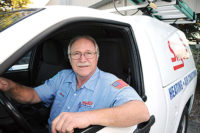
Both of those aspects of learning are the reason for the Refrigeration Service Engineers Society (RSES). It was formed in 1933 with its primary purpose not political action or basic business guidance - but to provide technical training.
The organization has thousands of members made up primarily of individuals. The training process starts with more than 400 chapters throughout the United States and Canada. Many hold monthly meetings.
Most of the time the meeting is turned over to a technical talk from a manufacturer representative, a wholesaler, or an educator. Chapters can also offer a range of training courses prepared by the society's headquarters in Des Plaines, Ill. They cover such areas as heat pumps, controls, electricity, heating, refrigeration, and air conditioning. Each aspect has several levels beginning with basics and moving up to advanced studies. An experienced chapter member usually teaches courses in the evening once a week over a number of weeks.
Most chapters also plug into regional and state associations. While those state/regional events include various procedural matters to fulfill bylaws, sessions are also given to training such as a recent Illinois State Association meeting that included two days of seminars dealing with heating.
Once a year, RSES has an international conference combined with an HVACR technology expo. Even there, procedural and legal matters share attention with technical talks.
For example, the recent 68th Annual Conference in Atlanta had close to two dozen seminars on such topics as indoor air quality (IAQ), compressors, carbon monoxide, electric motors, supermarket refrigeration, controls, refrigerant recovery, ice machines, and duct work; tours to facilities operated by Hill PHOENIX, Carlyle, and Heatcraft; and an exhibit hall with some 50 companies showing wares - and in at least one case, sitting down attendees in the booth for a bit more training.
"RSES is the premier educational society in the industry," said Ken Goetz, a member of the Southern Tier Chapter in Binghamton, N.Y., and a wholesaler with Northrup Supply. Goetz was recognized at the Atlanta conference as the Speaker of the Year.

The Certification Context
While training often focuses on specific aspects of a system and certain components, the society also offers training programs for EPA Section 608 Certification, R-410A certification, and NATE certification. Related to such matters are reference materials made available by RSES to help prepare a person to take various certification exams.Within its membership, it awards Certificate Member (CM) and Certificate Member Specialists (CMS) recognitions. Tests are difficult, usually resulting in not much better than a 30 percent passage rate. But test takers are told what aspects of a test they were weakest in and can retake tests at a nominal charge. Achievement is considered a badge of honor within RSES.
The RSES Technical Institute is described as a "comprehensive course of study designed to help members who desire to attain the highest levels of technical competency within the HVACR industry."
Training manuals help members advance through the levels of the institute in such areas as refrigeration and air conditioning, electricity, heating, and controls. Continuing Education Units are available to those who take instructor-led courses, rather than using the self-study option. NATE has recognized the RSES Technical Institute training manuals as well as many other RSES training courses for continuing education credits.
Of even more recent vintage is a four-year apprentice program that has been submitted to the Department of Labor for approval, according to Robb Isaacs, executive vice president of RSES. He said the program - which can be offered by chapters, states, and regions within RSES and by contractors and schools - provides three years of textbook study and a fourth year "cafeteria" option geared to the needs of specific geographical areas.
Said Isaacs, "RSES is offering the educational side of an apprentice program. Someone who might be in another line of work can take this program and then say to a contractor, ‘I have my four years of education. Can you give me the on-the-job training?'"

Counting The Costs
Chapter meetings with guest speakers are usually free, and many chapters open meetings to both members and nonmembers. While some training opportunities are for members only, much is available to anyone in the industry on a fee basis usually set up in two-tiers for members and non-members. The idea is to encourage members to get as much training as possible and end up paying less than a nonmember, possibly even offsetting annual dues. At the same time, by providing much of the material industry-wide, the society said it is demonstrating its commitment to help meet the educational needs to anyone who works in the HVACR field.With all the educational opportunities available, RSES officials often wish there was a better response from members and non-members when seminars are offered and materials are promoted.
In the movie "Field of Dreams," a voice is heard to say, "If you build it, they will come." RSES has built rather extensive ways to learn. Now the society hopes those in the HVACR industry will come in increasing numbers.
For more information, go to www.rses.org or call 847-297-6464.
Publication date: 10/31/2005



